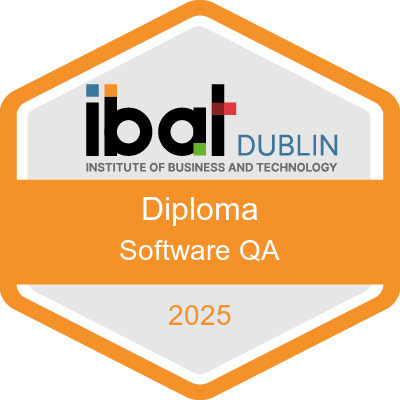- Why Software QA?
- Course Details
- Career Opportunities
- Entry Requirements
Why Software QA?
This is a comprehensive and up-to-date program that provides extensive skills and knowledge development in the fields of manual and automatic software testing. It includes both theoretical and practical content in software testing, using focused exercises, simulations and projects that train you to deal with real-life situations.
The expertise of those within QA jobs can help to identify existing and potential flaws in a product before it goes to market, avoiding the inevitable costly embarrassments later on.
Ireland’s reputation in the tech industry is unrivalled, with 16 of the top 20 global tech companies and the top 3 enterprise software providers based here (IDA).
106,000+ people are employed in the ICT industry in Ireland (IDA) making the country a centre of software excellence, unrivalled in Europe.
Given the prevalence of computing technology in the country, software testers are in very high demand. Employment for software developers, quality assurance analysts and testers to grow is expected to grow 22% from 2019 to 2029 (Indeed), this pace is faster than any other occupation.
Course Overview
Software Quality Assurance (QA) and the software testing profession has evolved with the rapid growth in the rise of technology. Continuous work processes are integrated into software development processes to maintain stability and enable the evolving technology to function properly.
The work processes include planning according to structured methodologies, working according to work procedures and integrating testing tools and their application to work processes. It is important to implement these processes as part of an overall quality approach, as it ensures the survival and relevance of organizations in today’s business environment. For this reason, the software testing profession has become one of the most sought-after professions in organisations.
Course Content
Introduction:
- Knowledge of the computing world
- Introduction to LINUX operating system
- Communications and networks
- Introduction to Information Systems
Manual QA:
- Introduction to the world of software testing
- Introduction to Software Quality Assurance
- ALM and Software Testing
- Types of testing
- Software testing documents -the stages of the software testing process and its products
- Adapting the testing methodology to the development methodology
- Introduction to databases, use of assembly and database planning, SQL query writing
- Using the Microsoft MTM Software Testing Tool
- Web Testing & Requirements Traceability Matrix
- Cyber and software testing
- Mobile Testing
- Software Testing & Resource Estimation
Automation QA Master:
- Object Oriented Programming and Java Language (Java Web & REST)
- Introduction to Testing Automation
- JUnit
- CI – Testing Automation with Jenkins
Assessment
The programme is assessed through a series of projects through the term.
We also look at sample questions for the International Software Testing Qualifications Board, though Ibat Dublin is not a test centre for ISTQB and passing the ISTQB exam is not a requirement for completing the programme.
What is a Professional Diploma?
An IBAT Professional Diploma is a focused, short duration practical course that consolidates, upskills and/or reskills learners in a professional area. They are stand-alone qualifications that do not lead to an award on the National Framework of Qualifications (NFQ).
Career Opportunities
Time is given in the programme to consider Software Career Path Options, and there is a Software Industry expert presentation to help with queries on this also.
Also, those who successfully complete the programme can explore related programmes in our Professional Diploma suite, or seek an industry position.
Entry Requirements
This diploma is suitable for you if you are interested in gaining practical knowledge in the fields of manual and automatic software testing.
Please note: Visas are not offered for any of our diploma courses.
Why Study at IBAT Dublin?
We are Ireland’s leading enterprise-focused third level institution with a special focus on how we guide, support, and mentor our students throughout their college experience and into their working lives.
We know that employers need graduates that can hit the ground running, so we’ve tailored our courses to prepare you to do just that. And if you need an extra hand, our Academic team equipped with years of lecturing and industry experience are ready to support you both in your professional and personal development.
Diverse Programmes
Take your pick of our wide range of courses, each designed with your future in mind.
Expert Tutors
Learn from industry professionals at the very top of their game.
Flexible Learning
Life happens. We get it. Study and achieve your goals on your schedule.
Central Location
Study at one of our two campuses placed in the heart of central Dublin.
Small Class Sizes
Get one-to-one, personalised support from our tutors.

Meet Our Students
Hear from our students as they share why they chose IBAT Dublin and the invaluable benefits they’ve gained from their journey with us.
Study options
You can attend lectures Online or On Campus, offering maximum flexibility with your time and how you learn.









